Bond LSC Research
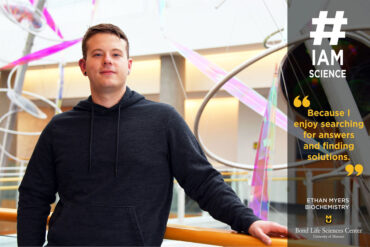
May 3, 2019
#IAmScience Ethan Myers
Ethan Myers is a senior biochemistry major studying oil production in soybeans. | photo by Mariah Cox, Bond LSC By Mariah Cox Preparing home-cooked meals regularly and maintaining houseplants can oftentimes be too time-consuming for stressed-out college students, but not for Ethan Myers. At Myers’ student apartment you can find a bonsai tree and a plethora of herbs such as catnip, basil, mint and even some pepper plants. This love of plants comes from his childhood when he spent his summers helping his grandma plant shrubs, flowers and trees in her garden. Using the herbs she…
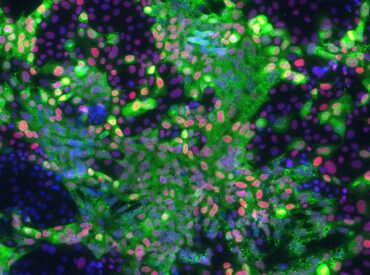
April 11, 2019
The problem with placentas
MU scientists develop model to study complex pregnancy disease Here, stem cells have undergone differentiation. The green shows the hormone used to diagnose pregnancy in humans and the ovals are nuclei, some of which stain a pinkish color, representing the protein GATA2. By Danielle Pycior | Bond LSC Researchers have been exploring the complicated and difficult world of pluripotent stem cells for 15 long years on the second floor of the University of Missouri’s Bond Life Sciences Center. A type of stem cell that can be turned into any cell in the human body and…
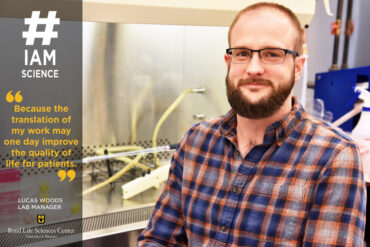
March 22, 2019
#IAmScience Lucas Woods
By Mariah Cox | Bond LSC Ten years ago, Lucas Woods stepped into Gary Weisman’s lab with a fresh perspective on P2 cell receptors. Now, as an experienced lab manager, Woods dives deeper into the role of these receptors in a myriad of diseases. Woods came to the Bond Life Sciences Center after graduating from Missouri State University in Springfield with a degree in cell and molecular biology. He studied P2 receptors as a part of his undergraduate research with Dr. Richard Garrad, who completed his post-doctoral research in Weisman’s lab. Garrad recognized Woods’s interest…
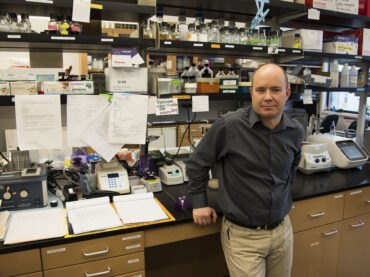
Feb. 27, 2019
B TrCP protein required for HIV to hide in host cells
Researchers are one step closer to understanding HIV By Danielle Pycior | Bond LSC Usually, the human immune system is good at recognizing infected cells and then killing them, but in the case of the human immunodeficiency virus (HIV), the virus has ways to hide. One of the ways is by using a viral protein called Vpu. Vpu helps HIV survive by hiding the fact that it is infected from its host cells. For the past few years, researchers at the University of Missouri have helped uncover how this works. “If you delete Vpu, those virus-infected cells…

July 25, 2018
A shift in focus: Lorson moves basic research to drug development
By Roger Meissen & Erica Overfelt | Bond LSC It takes a lot to move a discovery from lab bench to an application that can provide therapeutic benefits to those suffering from disease. Bond LSC’s Chris Lorson is making moves to bridge that gap with the start of Shift Pharmaceuticals. With its formation in March 2017, Lorson adds co-founder and Chief Science Officer of the company to his list of titles that include Bond LSC investigator, professor of veterinary pathobiology and associate dean for research and graduate studies. Shift Pharmaceuticals builds off of years of progress the Lorson Lab has…
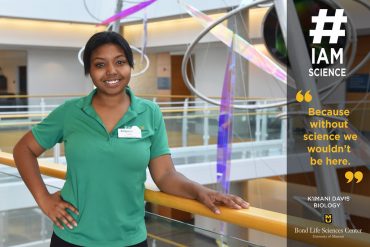
July 20, 2018
#IAmScience K’Imani Davis
By Erica Overfelt | Bond LSC From hate to passion. One class changed senior K’Imani Davis’s mind, who is now going into her senior year working in the Anand Chandrasekhar lab at Bond LSC. “I used to actually hate science, and when I say hate, I hated it,” Davis said. “Senior year of high school I took AP Bio, I loved it. I don’t know what happened, but I started to try and I liked the subject.” After Davis’s change of heart, she decided to start out at MU as a biology major, and she is now going…
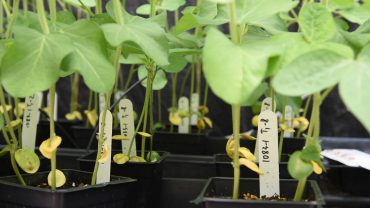
Aug. 18, 2017
Drowning in Data
New web-based framework helps scientists analyze and integrate data By Emily Kummerfeld | Bond LSC Large-scale data analysis on computers is not exactly what comes to mind when thinking about biological research. But these days, the potential benefit of work done in the lab or the field depends on them. That’s because often research doesn’t focus on a single biological process, but must be viewed within the context of other processes. Known as multi-omics, this particular field of study seeks to draw a clearer picture of dynamic biological interactions from gigantic amounts of data. But, how exactly can scientists suitably…
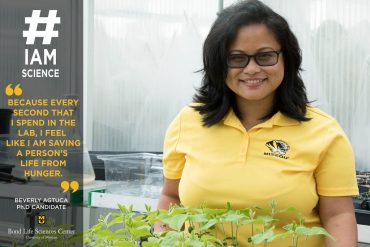
Aug. 11, 2017
Beverly Agtuca #IAmScience
Beverly Agtuca was born in New York, but has family in the Philippines, a country that struggles with malnutrition and undernourishment. Her overall goal for her research is to help countries that struggle with undernourishment by increasing the agricultural productivity in those countries. “When I was little, I went on summer vacation to visit my family, which included my grandmother in the Philippines,” she said. “Everyday my grandmother wanted me to go out to the rice fields from 5 a.m. to 10 p.m. with the other children to get rice for our meals. That was not…
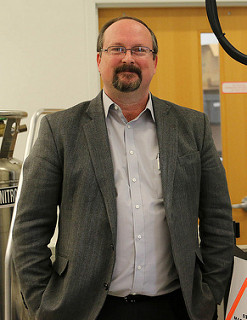
Aug. 11, 2017
Weighty science
Metabolomics center delves into the unknown Emily Kummerfeld | Bond LSC What do you do when you have an unknown substance and need to know what it’s made of? Or what if you know what’s in it, just not how much? Scientists turn to metabolomics to figure out what these pieces are. Lloyd W. Sumner, Director of the Metabolomics Center at MU’s Bond Life Sciences Center, said analyzing a sample is like going to the doctor and having blood drawn to assess what’s happening inside of your body. “Plants can’t tell us what’s going on, animals can’t do that either,…
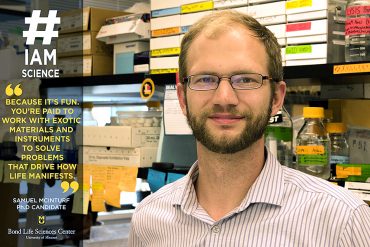
Aug. 4, 2017
Samuel McInturf #IAmScience
Samuel McInturf, Ph.D. candidate “#IAmScience because it’s fun. You’re paid to work with exotic materials and instruments to solve problems that drive at how life manifests.” Samuel McInturf’s father is an accountant and his mother is an HR director, but somehow he ended up falling in love with science. By the 4th grade he had already asked his parents to buy him a compound microscope. He completed his undergraduate degree in plant biology at University of Nebraska, Lincoln with a minor in biochemistry. Now, he’s finishing up his fifth year pursuing a Ph.D…
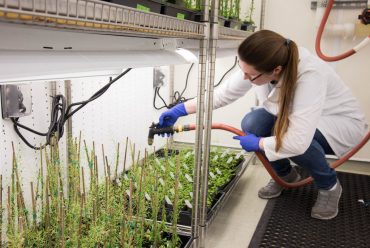
Aug. 1, 2017
How one bad seed could take on climate change
By: Samantha Kummerer | Bond LSC It’s no secret that the 21st century continues to set records with the warmest years in earth’s history and rising carbon dioxide and sea levels. These significant changes threaten the planet’s future and already challenge farmers. Mannie Liscum, a Bond LSC investigator, said research in his lab may help address these problems. They accidentally came across a variation of a plant that reveals multiple adaptive traits, including early flowering “A variant that flowers early and has other advantageous traits could be very useful because that variant could be grown in more northern latitudes where…
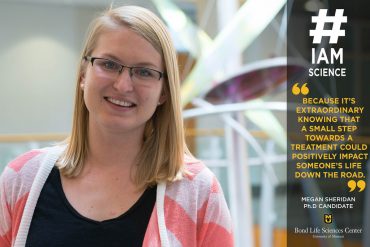
July 25, 2017
Megan Sheridan #IAmScience
Megan Sheridan, a Ph.D candidate in biochemistry, works in Dr. Michael Robert’s lab. | Photo by Mary Jane Rogers, Bond LSC By Mary Jane Rogers | Bond LSC “#IAmScience because it’s extraordinary knowing that a small step towards a treatment could positively impact someone’s life down the road.” Megan Sheridan doesn’t let anything slow her down. From presenting at the Society for the Study of Reproduction’s Trainee Research Competition last week—and winning first place—to finishing up her thesis while working in Dr. Michael Roberts’ lab, she’s always juggling multiple projects. Sheridan is finishing up a Ph.D…